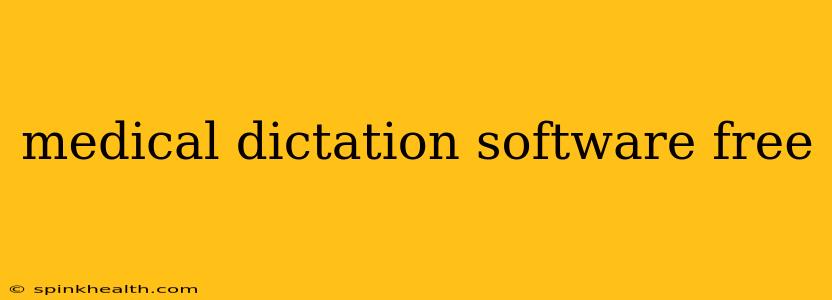The world of healthcare is a whirlwind of activity, and for doctors, nurses, and other medical professionals, time is often the most precious commodity. Imagine a world where you could dictate your notes, reports, and prescriptions, instantly converting your spoken words into crisp, accurate text. That's the power of medical dictation software, and while many powerful options come with a price tag, there are also free alternatives that can significantly boost your productivity. But are they truly sufficient for the demands of a busy medical practice? Let's dive in.
What are the Best Free Medical Dictation Software Options?
The straightforward answer is: finding truly robust, completely free medical dictation software with advanced features is challenging. Many "free" options offer limited features or functionality, often acting as trials or freemium versions leading to paid subscriptions. However, there are some avenues you can explore:
Free Trials and Freemium Models
Many reputable medical dictation software companies offer free trials of their products. This allows you to experience the software's capabilities firsthand before committing to a purchase. While not permanently free, these trials give you a valuable opportunity to assess whether the software meets your specific needs and workflow. Keep an eye out for promotions or limited-time free access.
Free Mobile Apps with Basic Dictation
Several mobile apps offer basic speech-to-text capabilities, some of which are free. These are often suitable for quick notes or short entries, but their accuracy and medical terminology handling might be limited compared to dedicated medical dictation software. Consider these options for basic tasks but remember limitations in medical accuracy and HIPAA compliance.
Is Free Medical Dictation Software Accurate Enough?
This is a crucial question. While free options might transcribe your speech, the accuracy, particularly with medical terminology, is a major consideration. Medical reports require precision; a simple misinterpretation could have serious consequences. Free software often struggles with medical jargon, abbreviations, and proper names. The accuracy often hinges on factors like your speaking clarity, background noise, and the software's algorithm. Expect a higher error rate, requiring more manual correction.
How Can I Improve the Accuracy of Free Medical Dictation Software?
If you opt for a free or limited version, several strategies can improve accuracy:
- Speak clearly and slowly: Enunciate words carefully and avoid mumbling.
- Minimize background noise: Find a quiet environment for dictation.
- Use a high-quality microphone: A good microphone significantly improves speech recognition.
- Proofread meticulously: Always review and correct any errors in the transcription.
What are the Features of Paid Medical Dictation Software?
Paid software offers several advantages often lacking in free options:
- Improved Accuracy: Advanced algorithms and medical-specific dictionaries ensure greater accuracy.
- HIPAA Compliance: Essential for protecting patient data.
- Advanced Features: These include features like voice commands, template integration, and seamless integration with electronic health record (EHR) systems.
- Robust Customer Support: Provides assistance when needed.
What are the Best Free Transcription Services for Medical Notes?
While not strictly "software," several online transcription services provide medical transcription at varying prices, sometimes offering free trials or limited free transcriptions. The accuracy is generally higher than most free software, but it still requires review and may not offer the speed of real-time dictation software. This could be a viable option for those with less urgent needs and are willing to wait for completed transcriptions.
Can I Use General Speech-to-Text Software for Medical Purposes?
Using general-purpose speech-to-text software for medical documentation is generally not recommended, especially for formal reports. The accuracy and security aspects may not be sufficient for maintaining patient confidentiality and complying with medical standards.
In conclusion, while free options exist, their limitations can impact productivity and accuracy. The best approach depends on your budget, needs, and the level of accuracy required for your medical documentation. Weigh the advantages and disadvantages carefully before choosing your solution. The investment in a robust, paid medical dictation software may ultimately save you time and ensure the accuracy vital in healthcare.

